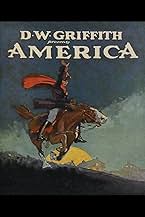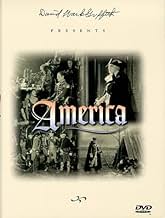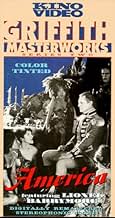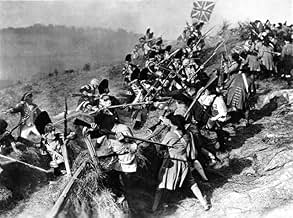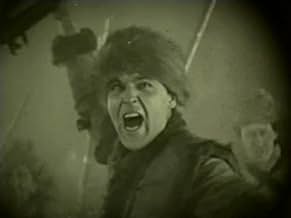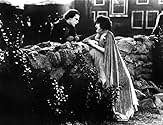अपनी भाषा में प्लॉट जोड़ेंThe story of a family caught up in the American Revolutionary War.The story of a family caught up in the American Revolutionary War.The story of a family caught up in the American Revolutionary War.
- पुरस्कार
- कुल 1 जीत
Lucille La Verne
- A Refugee Mother
- (as Lucile La Verne)
Paul Doucet
- Marquis de Lafayette
- (as H. Paul Doucet)
फ़ीचर्ड समीक्षाएं
I really wanted to like this film and I don't think I was terribly disappointed. Being an American History teacher, I felt an obligation, almost, to see this film and as far as the history went, it wasn't bad. Sure there were a few mistakes here and there (especially with the timeline--the movie only appeared to last a few months or perhaps a year--not over six years of actual fighting), but the overall spirit of the film and the battle sequences were excellent. Unfortunately, the movie ALSO included a pretty meaningless subplot involving a difficult to believe romance between a poor patriot and a rich Loyalist. For the most part, it really served to distract from the overall plot and just seemed "tacked on"--like a plot device instead of a real honest-to-goodness romance. In fact, as much of the romance boiled down to the dumb cliché of "love at fist sight", it was kind of annoying the more I think about it.
However, in spite of this romance, the film is truly interesting and inspiring---plus, in so many ways it seems as if the much later film, THE PATRIOT, was copied from this Griffith film!!! Both films followed the exploits of an evil leader fighting for the British and using horrible and evil tactics against the civilians--and both having the secret intention of using this as a "springboard" to starting their OWN nation in the America!!! The only major difference is that this film is set in the North and THE PATRIOT was in the Carolinas. It sure would have been nice if Mel Gibson and the rest had acknowledged their debt to D. W. Griffith for the story ideas. It just doesn't seem all that likely that the two stories were created independently of each other.
PS--Despite me liking this film and some other of Griffith's films, he DOES deserve to once again "burn in hell" for his having White actors portray all the Black servants in the film! This is a sick and bigoted thing that Griffith did in so many of his films--especially in BIRTH OF A NATION. I gotta assume based on this and the way he portrays Blacks that he was A-OK with slavery and was quite the apologist for this "quaint institution" (don't get mad at me--this IS meant as sarcasm).
However, in spite of this romance, the film is truly interesting and inspiring---plus, in so many ways it seems as if the much later film, THE PATRIOT, was copied from this Griffith film!!! Both films followed the exploits of an evil leader fighting for the British and using horrible and evil tactics against the civilians--and both having the secret intention of using this as a "springboard" to starting their OWN nation in the America!!! The only major difference is that this film is set in the North and THE PATRIOT was in the Carolinas. It sure would have been nice if Mel Gibson and the rest had acknowledged their debt to D. W. Griffith for the story ideas. It just doesn't seem all that likely that the two stories were created independently of each other.
PS--Despite me liking this film and some other of Griffith's films, he DOES deserve to once again "burn in hell" for his having White actors portray all the Black servants in the film! This is a sick and bigoted thing that Griffith did in so many of his films--especially in BIRTH OF A NATION. I gotta assume based on this and the way he portrays Blacks that he was A-OK with slavery and was quite the apologist for this "quaint institution" (don't get mad at me--this IS meant as sarcasm).
America (1924)
*** (out of 4)
This film is basically a remake of The Birth of a Nation but this time the story is set during the American Revolutionary War. We have George Washington (Arthur Dewey) trying to make our country free while Capt. Walter Butler (Lionel Barrymore) tries to get the Indians on his side to attack what one hopes to become the new America. In the mean time, two young lovers (Neil Hamilton, Carol Dempster) are split apart due to them fighting on opposite sides of the war. This film was a notorious flop when originally released and everything Griffith made after this was basically done so that he could clean up debts gathered by this film. Time has certainly been kinder to the film than movie crowds in 1924 because this is a pretty strong take on the war that features a nice story, great battle scenes and some fine performances. Barrymore steals the show with his crazed performance but he never goes over the top but even without words you can see the passion on his face as he fights for what he believes is right. Hamilton and Dempster are both fine in their roles, although I'm sure stronger actors would have been better. The majority of the film deals with the actual story of the war and not the battle scenes. Griffith handles all the quiet moments very well but there's no question that the battle scenes are where the energy is at. Hundreds of extras were used and again, like previous Griffith epics, the battle scenes look incredibly realistic as if Griffith were there filming while the real battles were taking place. The story of the families being split apart probably would have worked better had it not been so familiar as to the story in The Birth of a Nation but either way this was Griffith's last epic and while it's not the masterpiece of The Birth of a Nation or Intolerance, it's still impressive film-making.
*** (out of 4)
This film is basically a remake of The Birth of a Nation but this time the story is set during the American Revolutionary War. We have George Washington (Arthur Dewey) trying to make our country free while Capt. Walter Butler (Lionel Barrymore) tries to get the Indians on his side to attack what one hopes to become the new America. In the mean time, two young lovers (Neil Hamilton, Carol Dempster) are split apart due to them fighting on opposite sides of the war. This film was a notorious flop when originally released and everything Griffith made after this was basically done so that he could clean up debts gathered by this film. Time has certainly been kinder to the film than movie crowds in 1924 because this is a pretty strong take on the war that features a nice story, great battle scenes and some fine performances. Barrymore steals the show with his crazed performance but he never goes over the top but even without words you can see the passion on his face as he fights for what he believes is right. Hamilton and Dempster are both fine in their roles, although I'm sure stronger actors would have been better. The majority of the film deals with the actual story of the war and not the battle scenes. Griffith handles all the quiet moments very well but there's no question that the battle scenes are where the energy is at. Hundreds of extras were used and again, like previous Griffith epics, the battle scenes look incredibly realistic as if Griffith were there filming while the real battles were taking place. The story of the families being split apart probably would have worked better had it not been so familiar as to the story in The Birth of a Nation but either way this was Griffith's last epic and while it's not the masterpiece of The Birth of a Nation or Intolerance, it's still impressive film-making.
Slow but beautifully-mounted story of the American revolution. Griffith's story-telling seems a lot less heavy-handed than in his earlier historical epics and his tableaux work is fully integrated into the action. Lionel Barrymore is an utter swine, Neil Hamilton is poor but dashing and Carol Dempster is.... well, Carol Dempster is most of what is wrong with Griffith in this period, but she doesn't show up often enough to slow the pace and drama.
Note that the trivia for this movie says it came in originally at slightly more than 2 hours when first released, but that no cut exists that runs longer than 90 minutes. However, the dvd release has been presented at a slower fps rate that increases the tension and brings it back to a bit over two hours.
Far better in terms of story-telling than sound versions, such as THE PATRIOT. While not quite in the league of Griffith's best, such as WAY DOWN EAST and BROKEN BLOSSOMS, an excellent way to spend a couple of hours.
Note that the trivia for this movie says it came in originally at slightly more than 2 hours when first released, but that no cut exists that runs longer than 90 minutes. However, the dvd release has been presented at a slower fps rate that increases the tension and brings it back to a bit over two hours.
Far better in terms of story-telling than sound versions, such as THE PATRIOT. While not quite in the league of Griffith's best, such as WAY DOWN EAST and BROKEN BLOSSOMS, an excellent way to spend a couple of hours.
Appropriately subtitled "Love and Sacrifice", director D.W. Griffith's fictionalized account of revolutionary "America" should have been more successful, given the obvious costly effort in evidence; it is weighted down by lack of imagination, and a significantly unsuitable performance from the leading actress. Still, it offers many worthwhile scenes; and, some legendary scenes are brought beautifully to life. Griffith gentlemanly reveals prejudices early, explaining, "The story of the sacrifice made for freedom in the American Revolution is that of a civil war between two groups of English people; one group, the Americans, being merely Englishmen who settled on the American Continent."
Moreover, Griffith asserts, "The government which Canada and Australia now enjoy was absolutely denied to America through the stubborn and false ideals of the autocratic powers guiding the hand of King George the Third." During the running time, Griffith uses Royalist Walter Butler to represent the evil on the other side of the Atlantic Ocean. Were it not for Mr. Butler, the Revolution might have been settled amicability! Not as despicable a thesis as presented Griffith's similarly plotted Civil War epic, but neither is "America" as excitingly presented as "The Birth of a Nation".
And, try as they might, Neil Hamilton (as Nathan Holden) and Carol Dempster (as Nancy Montague) are not Robert Harron and Lillian Gish in "Hearts of the World".
Griffith's epics are much more convincing with when characterizations and relationships are well presented. Mr. Hamilton, as the poor young New Englander, has no rapport with Ms. Dempster. And, as the Virginia belle, Dempster is wrongly directed. Compare Dempster/Hamilton with Gish/Harron in "Hearts of the World". Or, even better, with Gish/Harron in "A Romance of Happy Valley". The later film shows how well Ms. Gish and Mr. Harron played the "bedroom window" scene which Griffith re-visits in "America". Hamilton, a promising actor, had a great career highlight, later, as "Commissioner Gordon" of "Batman" in the 1960s; but, ribald Lionel Barrymore (as Butler) steals the acting honors. Griffith used his stars better in the forthcoming "Isn't Life Wonderful?"
****** America (2/21/24) D.W. Griffith ~ Neil Hamilton, Carol Dempster, Lionel Barrymore
Moreover, Griffith asserts, "The government which Canada and Australia now enjoy was absolutely denied to America through the stubborn and false ideals of the autocratic powers guiding the hand of King George the Third." During the running time, Griffith uses Royalist Walter Butler to represent the evil on the other side of the Atlantic Ocean. Were it not for Mr. Butler, the Revolution might have been settled amicability! Not as despicable a thesis as presented Griffith's similarly plotted Civil War epic, but neither is "America" as excitingly presented as "The Birth of a Nation".
And, try as they might, Neil Hamilton (as Nathan Holden) and Carol Dempster (as Nancy Montague) are not Robert Harron and Lillian Gish in "Hearts of the World".
Griffith's epics are much more convincing with when characterizations and relationships are well presented. Mr. Hamilton, as the poor young New Englander, has no rapport with Ms. Dempster. And, as the Virginia belle, Dempster is wrongly directed. Compare Dempster/Hamilton with Gish/Harron in "Hearts of the World". Or, even better, with Gish/Harron in "A Romance of Happy Valley". The later film shows how well Ms. Gish and Mr. Harron played the "bedroom window" scene which Griffith re-visits in "America". Hamilton, a promising actor, had a great career highlight, later, as "Commissioner Gordon" of "Batman" in the 1960s; but, ribald Lionel Barrymore (as Butler) steals the acting honors. Griffith used his stars better in the forthcoming "Isn't Life Wonderful?"
****** America (2/21/24) D.W. Griffith ~ Neil Hamilton, Carol Dempster, Lionel Barrymore
Neil Hamilton played the lead in Griffith's big-budgeted and sprawling February 1924 "America." In a rare Hollywood film about the Revolutionary War, "America," marking the near 150th anniversary of the conflict's beginning, offers a love story in the middle of the pivotal moment in the United States' founding. Nathan (Hamilton), who sympathizes with the rebels and is a minuteman, is in love with Nancy (Dempster), whose father is a Tory. The Romeo and Juliet romance bounces around as Griffith captures the opening rounds of the Revolutionary War with the battles of Lexington and Concord, Massachusetts, followed by scenes of Valley Forge. The director's trademark heart-pounding conclusion that he perfected in his 1915 'The Birth of a Nation,' is found in "America." Cross-cutting between a fort filled with settlers under siege from the British and its allied Indians with the horse-bound Morgan raider colonists rescuers normally would assure this Griffith movie was going to be a box office smash.
The director, after spending a considerable amount of his personal money into the project, saw just the opposite in the amount of empty seats in the theaters. The critics were split down the middle on its praise, but even Griffith loyalist Lillian Gish, in her autobiography, wrote, "Apart from a few scenes, the film was a heartbreaking disappointment." The receipts were so thin that Griffith, following the dismal reception in "Life Is Wonderful," was forced to sell his Mamaroneck, New York, movie studio as well leave United Artists. He found himself now as an independent director for hire, something that never crossed his mind before 1924.
The director, after spending a considerable amount of his personal money into the project, saw just the opposite in the amount of empty seats in the theaters. The critics were split down the middle on its praise, but even Griffith loyalist Lillian Gish, in her autobiography, wrote, "Apart from a few scenes, the film was a heartbreaking disappointment." The receipts were so thin that Griffith, following the dismal reception in "Life Is Wonderful," was forced to sell his Mamaroneck, New York, movie studio as well leave United Artists. He found himself now as an independent director for hire, something that never crossed his mind before 1924.
क्या आपको पता है
- ट्रिवियाThis film is regarded as a major turning point in the career of D.W. Griffith. Its critical and public failure ended Griffith's tenure as the industry's preeminent director.
- गूफ़Paul Revere falls off his horse. For some reason, Griffith has Revere ride up the steps of people's homes to announce "The British are coming!" as if he has to shout this at their doors. Backing down one set of stairs, Revere's horse falls, tossing the actor, who quickly recovers and shows considerable concern for the horse's welfare. Griffith left in the spill.
- भाव
Nathan Holden: Love may come and love may go, and sigh like the wind from tree to tree. But I shall love no more, no more, till this fair maid come back to me.
- कनेक्शनEdited into The Negro Soldier (1944)
टॉप पसंद
रेटिंग देने के लिए साइन-इन करें और वैयक्तिकृत सुझावों के लिए वॉचलिस्ट करें
विवरण
- चलने की अवधि2 घंटे 21 मिनट
- ध्वनि मिश्रण
- पक्ष अनुपात
- 1.33 : 1
इस पेज में योगदान दें
किसी बदलाव का सुझाव दें या अनुपलब्ध कॉन्टेंट जोड़ें


